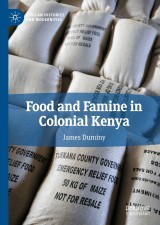Details

Food and Famine in Colonial Kenya
African Histories and Modernities
|
96,29 € |
|
| Verlag: | Palgrave Macmillan |
| Format: | |
| Veröffentl.: | 19.10.2022 |
| ISBN/EAN: | 9783031109645 |
| Sprache: | englisch |
Dieses eBook enthält ein Wasserzeichen.
Beschreibungen
<p>This book offers a genealogical critique of how food scarcity was governed in colonial Kenya. With an approach informed by the ‘analysis of government’, the study accounts for the emergence and persistence of dominant approaches to promoting food security in Kenya and elsewhere in Africa – policies and practices that prioritize increased agricultural production as the principal means of achieving food security. Drawing on a range of archival sources, the book investigates how those tasked with governing colonial Kenya confronted food as a particular kind of problem. It emphasizes the ways in which that problem shifted in conjunction with the emergence and consolidation of the colonial state and economic relations in the territory. The book applies a novel conceptual approach to the historical study of African food systems and famine, and provides the first longitudinal and in-depth analysis of the dynamics of food scarcity and its government in Kenya.</p>
<p><br></p><p></p>
<p><br></p><p></p>
1. Introduction.-2. Famine and Colonial Conquest.-3. Scarcity, State Control and the First World War.- 4. Scarcity and Settler Consolidation.- 5. Depression and Scarcity.- 6. Scarcity, State Control and War: Redux.- 7. Setting the Agenda.- 8. Conclusion.
<b>James Duminy</b> is Lecturer in Human Geography at the University of Bristol, UK. <br><div><br></div>
<p>This book offers a genealogical critique of how food scarcity was governed in colonial Kenya. With an approach informed by the ‘analysis of government’, the study accounts for the emergence and persistence of dominant approaches to promoting food security in Kenya and elsewhere in Africa – policies and practices that prioritize increased agricultural production as the principal means of achieving food security. Drawing on a range of archival sources, the book investigates how those tasked with governing colonial Kenya confronted food as a particular kind of problem. It emphasizes the ways in which that problem shifted in conjunction with the emergence and consolidation of the colonial state and economic relations in the territory. The book applies a novel conceptual approach to the historical study of African food systems and famine, and provides the first longitudinal and in-depth analysis of the dynamics of food scarcity and its government in Kenya.</p><p><b>James Duminy</b> is Lecturer in Human Geography at the University of Bristol, UK.<br></p><br><br>
Examines the history of food scarcity as a problem of government in Kenya Contributes to scholarship on the history of food, famine and colonial government in Africa Adds to current conceptual and methodological debates surrounding Foucauldian concepts
“In the context of emerging interest in current African food governance, <i>Food and Famine in Colonial Kenya</i> provides a vital analysis of why food problems are thought about and addressed in the ways that they are. Through an exceptional historical analysis of food governance in Kenya, the book demonstrates how a close reading of history can help us to understand and critique contemporary food policies and strategies. This book should be on the shelf of scholars of contemporary food governance in Africa and beyond.”<p></p>
<p>—<b>Jane Battersby</b>, University of Cape Town, South Africa</p>
<p> “James Duminy’s <i>Food and Famine in Colonial Kenya</i> provides an original and compelling analysis of the dynamics of colonial governmentality, one which resonates with wider debates about postcolonialism, environmental future, and the geopolitics of food security. It is an example of doing ‘the history of the present’ at its very best.”</p><p></p>
<p>—<b>Clive Barnett</b>, University of Exeter, UK</p>
<p>—<b>Jane Battersby</b>, University of Cape Town, South Africa</p>
<p> “James Duminy’s <i>Food and Famine in Colonial Kenya</i> provides an original and compelling analysis of the dynamics of colonial governmentality, one which resonates with wider debates about postcolonialism, environmental future, and the geopolitics of food security. It is an example of doing ‘the history of the present’ at its very best.”</p><p></p>
<p>—<b>Clive Barnett</b>, University of Exeter, UK</p>
Diese Produkte könnten Sie auch interessieren:

The Last Samurai - Japanische Geschichtsdarstellung im populären Kinofilm

von: Daniel Scherrer

34,99 €















